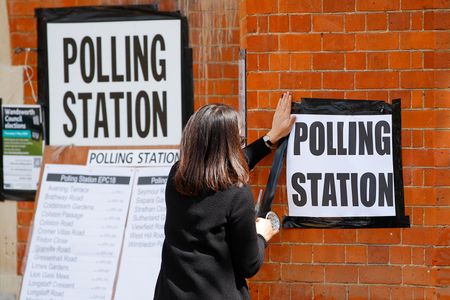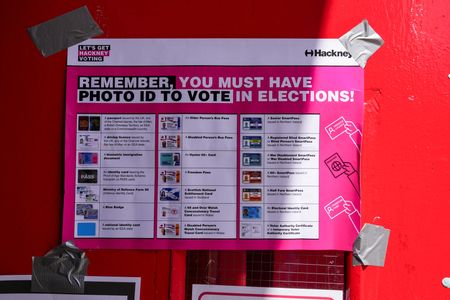By Sam Tabahriti and Catarina Demony
LONDON (Reuters) -Britain moved on Thursday to lower the voting age by two years to 16 in all UK elections, a major overhaul of the country’s democratic system that immediately split opinion over whether they should or would cast ballots.
The proposed changes were designed to boost participation and trust in the electoral system, which suffered its lowest turnout at the last national election in 2024 since 2001.
It would also align voting rights across Britain, where younger voters can already participate in elections to devolved parliaments in Scotland and Wales, but under 18s are barred from voting in elections to the British parliament.
“They’re old enough to go out to work, they’re old enough to pay taxes,” Prime Minister Keir Starmer told ITV News. “If you pay in, you should have the opportunity to say what you want your money spent on, which way the government should go.”
Globally, most countries have a voting age of 18. However, in last year’s European Parliament elections, European Union members were given the option to allow people to vote from the age of 16, a move taken by Germany, Belgium, Austria and Malta.
The change in Britain will require parliamentary approval, but it should pass given the policy was part of Starmer’s election campaign last year which gave him a large majority.
Despite that large win, Starmer’s popularity has fallen sharply in government after a series of missteps set against a difficult economic backdrop. His party sits second in most opinion polls behind Nigel Farage’s right-wing Reform UK party.
A poll of 500 16 and 17-year-olds conducted by Merlin Strategy for ITV News showed 33% said they would vote Labour, 20% would vote Reform, 18% would vote Green, 12% Liberal Democrats and 10% Conservative.
Sixteen and 17-year-olds interviewed by Reuters celebrated their newly granted right to vote, but said proper education was needed to make the idea work and protect voters from misinformation on social media.
“All the right-leaning sources get pushed far more than the left-leaning ones (on social media),” Matilda Behrendt, a 17-year-old student, said. “I think that will be a problem but it also means… various political ideologies can be spread and the ideas can be put across.”
ELECTORAL IMPACT?
Farage, who has a strong following on social media including TikTok, has opposed lowering the voting age, saying there was a left-wing bias in the educational establishment that would work against his party. But he vowed to turn that around.
“We’re going to get 16 and 17-year-olds to vote for us. You know why? Because, like me, they want to make Britain great again,” he said in a video posted on X.
There are about 1.6 million 16 and 17-year-olds in the UK, according to official data. Just over 48 million people were eligible to vote at the last election. The next one is due in 2029.
Britain’s Conservative Party, the second largest in parliament but which has fallen further behind rivals since losing power last year, said the proposal was inconsistent, with 16-year-olds due to be able to vote, but not allowed to “buy a lottery ticket, consume alcohol, marry, or go to war”.
Research from other countries and reviewed in a House of Commons library paper has shown lowering the voting age had no impact on election outcomes.
Anthony Wells, head of European political and social research at polling firm YouGov, said the likely impact was set to be extremely small, “for reasons of simple maths”.
To tackle foreign interference, the government also plans to tighten rules on political donations, including checks on contributions over 500 pounds ($670) from unincorporated associations and closing loopholes used by shell companies.
($1 = 0.7462 pounds)
(Reporting by Sam Tabahriti, Muvija M and Catarina Demony; Writing by William James; Editing by Kate Holton, Ros Russell, Alexandra Hudson and Alison Williams)












